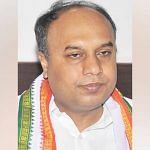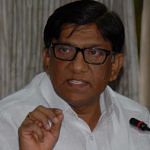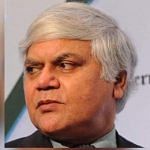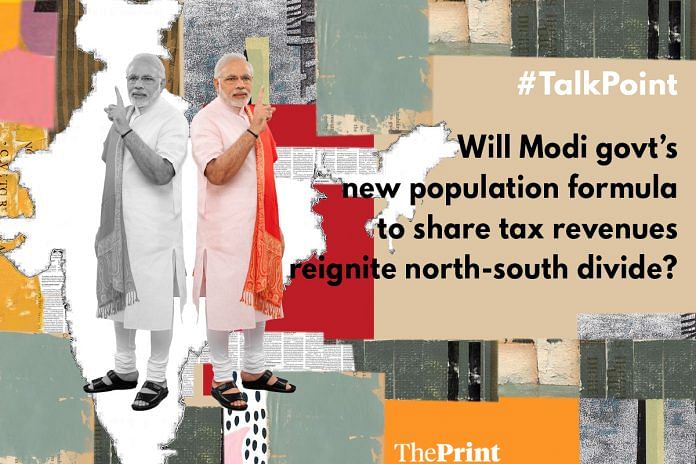The terms of reference of the 15th finance commission mandate the use of data from the 2011 census, instead of the one conducted in 1971. If implemented, critics claim, it will reduce the allocation of revenue to states in the south that have controlled population growth and performed better than many in the north.
Karnataka chief minister Siddaramaiah tweeted: “We need to redress regional imbalances in development. Question is should this be done by under investing in the south? Should development & population control not be incentivised? #SouthVsCentre.”
ThePrint asks: Will Modi government’s new population formula to share tax revenues reignite north-south divide?
Karnataka’s contribution is huge but what it receives from the Centre is very less
 Brijesh Kalappa
Brijesh Kalappa
Spokesperson, Indian National Congress, and advocate
Narendra Modi and Amit Shah have made it a habit to speak about how much money has been given to which state, and to ask for its account. This entire controversy began when Modi came to Karnataka and alleged chief minister Siddaramaiah had not utilised a huge amount of money he had personally sent to the state.
This is the same format that both Modi and Shah use to target what they call ‘unfriendly states’.
Now, in response, Siddaramaiah has said, “For every one rupee we send, you send us back 49 paise. And you have the gall to ask me how much money I’m spending? It’s my money that I’m sending to you.”
This is the correct response. Karnataka’s contribution is huge but its receipts are low. Take, for example, farm loan waivers. Under the Manmohan Singh government, we waived farm loans of up to Rs 72,000 crore. Under the Modi government, the Centre hasn’t even funded a fraction of that.
Everyone knows that Modi has received a huge windfall because of petrol prices. The international rate of crude is only one-third of what it was during the Congress regime. However, petrol prices in the country have not changed. The net gain from this, nearly Rs 3-6 lakh crore, has not been passed on to states. Who has Modi passed it on to? His corporate cronies.
Moreover, 73 per cent of resources in India are controlled by one per cent of its population. Modi is making the rich richer, and the poor poorer.
Our focus is totally skewed under Modi. On every occasion, we feel our money is being misutilised. Other states, which are allies of the Modi government, have received benefits, while we have received no contribution from the Centre despite three consecutive droughts.
The 2011-census formula will blight further our chances to get a reasonable contribution from the Centre. So, we are naturally very upset with it. It will even impact the number of seats in Parliament. This is extremely unfair to us.
It can’t be denied that the northern states are a little backward compared to those in the south
 B Vinod Kumar
B Vinod Kumar
MP, TRS, and advocate
We need to ask the basic question, why did the finance commission take into account the 1971 census so far? It is simple: It serves as an equaliser for population calculations between the north and the south.
Post 1971, the southern states implemented measures for family planning, which are missing in states like Uttar Pradesh, Bihar and Chhattisgarh to date. Obviously, the north has seen a rise in population, while the south has managed to control it.
The northern states are a little backward compared to the southern ones. This is a fact — it is on record and can’t be denied. But should the southern states be deprived for having performed well? They have done well on account of family planning, providing electricity in rural areas, building roads, sanitation.
The southern states should not be deprived of funds because they have performed better. That is just unfair.
In the early 1960s, the issue of Hindi created a north-south divide. Now, the BJP is again meddling in the affairs of Tamil Nadu. They have hurt the common man there. In Andhra Pradesh, there is an overall opinion that the state is being deprived.
The Modi government needs to rethink its entire strategy when it comes to talking about the southern states. A comparative study of the 2011 and 1971 census data will show that the move is ill-conceived.
Only selfish politicians would question the unity of India over how tax is collection and distributed
 Narendra Taneja
Narendra Taneja
National spokesperson, BJP
The attempt by the Congress and Karnataka CM Siddaramaiah to divide the country along north-south lines will never succeed. The Congress is facing an existential crisis across the country. It is staring at defeat in the Karnataka assembly polls this year, which is why they first took the Lingayat decision and are now alleging discrimination against the southern states.
The BJP has a strong presence among people all across southern India, and they can see through the Congress’ game plan of divide-and-rule. The people of Kerala, Karnataka, Tamil Nadu, Andhra Pradesh and Telangana, and all the other states, share the same feelings and emotions when it comes to the Republic of India. The Congress, evidently, has lost touch with the people.
India is not one entity due to our tax-collection system or how national tax revenues are distributed among states. Of course, such issues are important and must be addressed to the satisfaction of all. But no Indian, from the north to the south, except probably a few selfish politicians, would ever go the extent of questioning the very unity of India because of different perspectives on how tax collections should ideally be distributed. What unites India from the north to the south and from the east to the west are our common religions, cultures, traditions and the Constitution, among several others things.
The GSDP growth varies from state to state. In the 1950s, states like Uttar Pradesh and Bihar were doing better than many others. Today, most states in the south, as well as Haryana, are doing better than UP, Bihar and a few others. There are variations within states too. In UP, the western region is doing better than the eastern districts. In Haryana, just one district, Gurugram, accounts for the maximum share — up to 70 per cent — of tax revenues. That is what the federal India is all about.
Biggies like Mahindra, Hyundai and TVS or WIPRO and Infosys may be located in Tamil Nadu and Karnataka, but let us not forget they earn most of their revenues from the north, the west and the east. In short, India is all about interdependence among various states for their GSDP and holistic prosperity.
That said, any state that has an opinion on the issue of the 15th finance commission should sit and talk with New Delhi. The present NDA government, led by Prime Minsiter Narendra Modi, is all about constructive federalism and taking India forward, hand in hand with all the states.
The north-south game that the Congress and Siddaramaiah are trying to play has already been rejected by people across the southern states.
It can be a major political potboiler: Domineering Delhi, Centre-state financial relations, and absence of BJP in the South
 Manuraj Shunmugasundaram
Manuraj Shunmugasundaram
Spokesperson of DMK, and advocate
A letter from DMK executive president M.K. Stalin, urging 10 chief ministers to oppose certain unfavourable conditions being introduced for the 15th finance commission, has transformed into a political battle unlike any other. This has been followed by similar exhortations by the chief minister of Karnataka, and an invitation by the finance minister of Kerala for a meeting with all his southern counterparts. The present situation has all the ingredients to become a major political potboiler: Domineering Delhi, Centre-state financial relations, and complete absence of BJP in the south.
The other major sticking point between the southern and northern states is the language issue. Since the reorganisation of states in 1956, the south was split into four states; five with the creation of Telangana. Nevertheless, these five states are united in taking pride in their language — be it Kannada, Malayalam, Tamil or Telugu; and are resolute in their opposition to the imposition of Hindi against their wishes.
The arguments against the 15th finance commission are focused around two factors: (1) The change to the population criterion, which immediately places states that have controlled their population at a distinct disadvantage; and (2) the incentive proposed for laggard states, which, too, reduces the financial allocation for states that have successfully achieved social outcomes. There is a common misunderstanding that the “developed
southern states are against “underdeveloped” northern ones getting a greater share of funds. But this argument misses the point that all these decisions are being taken unilaterally and without any consultation.
While farmers of Tamil Nadu have been protesting for more than 12 months in New Delhi, the Centre moved swiftly to endorse the demand of Uttar Pradesh CM Yogi Adityanath to provide more than Rs 30,000 crore in farm loan waivers.
The real issue seems to be that, while the Centre should be playing the role of an impartial arbiter, it is New Delhi which is siding against the southern states. Does this have something to do with the fact that the southern states are ‘BJP-mukt’ as they would say? In any case, the BJP is guilty of working against the essential federal principles that have held this country together for so many years.
Punishing states that continue to languish goes against the Indian Republic’s spirit
 Pranay Kotasthane
Pranay Kotasthane
Fellow, Takshashila Institution
The ‘north-vs-south’ debate sidesteps other substantial flaws in the terms of reference of the 15th finance commission (FC).
The FC is responsible for recommending to the President the distribution of tax revenues between the Union and the states (vertical devolution) and between the states (horizontal sharing). The recommended distribution goes to the states in the form of un-tied transfers. This money does not come attached with a purpose; states can spend the money as they wish to. The objective of such general-purpose transfers is to enable comparable levels of public services at comparable tax rates. Given that there is not a lot of difference in the tax rates of various states in India, this implies that per capita general purpose transfers from the Union need to go to areas where the levels of public services are poorer.
Justifying the use of dated population data (1971 census) assumes that general-purpose transfers are levers for family planning. They aren’t. Family planning and population control are better managed through interventions on the expenditure side of budgets.
The idea of punishing individuals elsewhere in the country just because these areas continue to languish goes diametrically against the Indian Republic’s spirit.
But the more important point that has not come up for debate is this: By suggesting that the impact of the “generous” devolution by the 14th FC be reviewed, the 15th FC is being nudged towards reducing the tax devolution to states in order to meet the requirements of central schemes. But if general-purpose transfers are reduced, all states will lose their policy independence and, instead, be limited to implementing central schemes. This goes against the spirit of federalism.
Beyond economics, the anxiety of the southern states is political
 Rama Lakshmi
Rama Lakshmi
Editor, Opinion, ThePrint
Applying the 2011 census in its entirety is a matter of serious concern for states like Tamil Nadu and Kerala that have effectively controlled population growth. This issue had come up earlier as well when the 2011 census (10 per cent weightage) was taken as additional criteria to the 1971 census (17.5 per cent weightage). Around that time, Odisha chief minister Naveen Patnaik had objected to this.
The question of so-called ‘incentivising under-development’ with the recommendations of 15th finance commission has, once again, caused disquiet: why penalise the performers in order to take care of the under-performing states?
A similar question arose in 2000 at the conclave of eight states in the capital over the financial devolution formula proposed by the 11th finance commission. At that time, Andhra Pradesh CM Chandrababu Naidu had kicked up a row and locked horns with Lalu Prasad Yadav. He said this would weaken the performing states and said the backward states’ development should not be “at our cost”.
The media described it as the ‘secession of the successful.’
It appeared as if the nation was divided unfairly between performers and laggards. But the federal structure should be more about participation and not competition. This is hard to accept at a time when ‘inter-state competition’ is a celebrated buzzword.
Beyond economics, the anxiety of the southern states is political — over eventual delimitation of constituencies, fewer Lok Sabha seats, and reduced clout in New Delhi.
The concerns over the finance commission come on top of a series of differences between the Centre and the southern states — over Sanskrit, Hindi, and beef. It is not so much about ‘north-south divide’ as about ‘north-south difference’. Southern states have historically insisted on exercising this difference — political, ideological, and cultural.
But where’s the fire? No one has uttered the ‘S’ word, i.e, ‘secede’, yet.
Compiled by Deeksha Bhardwaj, Journalist at ThePrint.




Indeed a Pandora’s box-unlike Mr Tharoor’s logic that states would loose political clout if they develop well,while others would gain more seats in the parliament for failure,I foresee the effect as an eye opener for the south Indian states who are the pioneers in adopting the Tupperware culture to abandon it in favour of our traditional copperware culture,and in the same way too fast to adopt green.blue and white revolution only to abandon in favour of organic farming ,even for that matter adopting early family planning to reduce fertility rate only to promote commercialization of several fertility centres in the name of ultramodern health facilities,and finally trying to come out of their developmental illusions by putting the blame on the furthering of North south divide.
Let this decision pave ways to the so called BIMARU states to have a better stake in the national politics to bring back their lost glory,thanks to the colonial period that looted these once prosperous revenue units, bringing them under the shadow zone of South’s faulty developmental endeavor to be declared as BIMARU states.More over other than the BIMARU states there are the other states that would gain for their developmental efforts and as a whole, India can be a true federal democracy,where regional difference can be given due importance to chalk out better national plans to suit the regional or local tastes, without hampering the respect for a strong centre.
I guess Ambanis, Birlas, Tatas, Nilekani and all such “successful” and “wealthy” Indians feels beings looted by the gang of “poor”, “lazy”, “non-industrious”, poorly educated rest of 99 percent Indians. They might think, taxing them and redistributing it among the rest is nothing short of organized loot in the name of the republic and democracy. But alas, it is this republic that ensures their wealth is not looted, and this republic ensures that they can continue to milk this nation and continue to accumulate this wealth in the first place. I guess they understand all this and they are not complaining. But, Republic of Tamilnadu, Republic of Kerala and even Republic of Maharashtra might think otherwise. Just over 70 years since British had left India, we are inventing ways to defeat and destroy the actual republic our freedom fighters sacrificed their life, just the way they predicted, we uncivilized, will behave. Nehru and his fellow fighters dreamed and worked towards a imagined Republic of India, where all citizens are born equal, equal rights and privileges for all, irrespective of their race, colour of skin, mother’s tongue, religion, gender, political beliefs, place of birth and all imagined or real differences between the citizens. Of course today’s uncouth and the ugly, self styled intellectuals or opportunist politicians are hell bend of destroying this republic. We ordinary citizens can pray and work towards their destruction instead. Just for information, when the central govt, apparently “dominated” by the northern born, set up central govt industries like HAL, NAL, BEL, BHEL, HMT, BEML, ISRO, ITI and various othors such giants in Bangalore, transforming a sleeping British cantonment into the Bangalore of today, citizens of India didn’t complain.
Poorly written article. Raises more questions than answering the present situation. Should have thrown light on several details of Terms of reference of 15th FC and if earlier ones were different and in what respect.